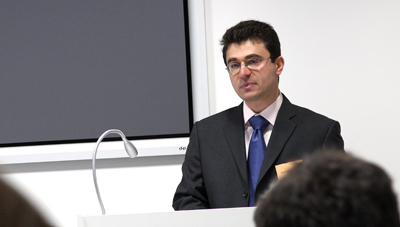Dr Gabriel Paquette: Balzan-Skinner Lecture and Symposium: Romantic Liberalism in Southern Europe, c. 1820-1850
Duration: 56 mins 53 secs
Share this media item:
Embed this media item:
Embed this media item:
About this item

| Description: |
Dr Gabriel Paquette (The Johns Hopkins University, US):
CRASSH Balzan-Skinner Fellow 2012-13 Romantic Liberalism in Southern Europe, c. 1820-1850 Email: gpaquet1@jhu.edu In 1820, revolutions broke out in Spain, Naples, and Portugal. The revolutionaries overthrew absolutist regimes and forced monarchs to accept written constitutions and some representative institutions. In the case of the Iberian countries, these years also were marked by the final dismemberment of their Atlantic empires. By 1823, the fledgling liberal governments in Southern Europe had collapsed. The leaders were imprisoned, exiled, or executed. Over the course of the succeeding decades, cycles of revolution and reaction dominated the politics of Southern Europe. The political tumult occurred against the backdrop of, and helped to inform, an extraordinarily fertile cultural moment, Romanticism, which in turn cross-pollinated the political thought of the epoch. By focusing on several leading political writers, poets, historians and novelists from different Southern European countries, the lecture will explore and analyze the intersections, connections, and divergences between Liberalism and Romanticism in Southern Europe in the first half of the nineteenth century. |
|---|
| Created: | 2013-05-02 10:14 |
|---|---|
| Collection: | CRASSH |
| Publisher: | University of Cambridge |
| Copyright: | Glenn Jobson |
| Language: | eng (English) |
| Keywords: | Gabriel Paquette; Balzan; Skinner; CRASSH; |
| Abstract: | Dr Gabriel Paquette (The Johns Hopkins University, US):
CRASSH Balzan-Skinner Fellow 2012-13 Romantic Liberalism in Southern Europe, c. 1820-1850 Email: gpaquet1@jhu.edu In 1820, revolutions broke out in Spain, Naples, and Portugal. The revolutionaries overthrew absolutist regimes and forced monarchs to accept written constitutions and some representative institutions. In the case of the Iberian countries, these years also were marked by the final dismemberment of their Atlantic empires. By 1823, the fledgling liberal governments in Southern Europe had collapsed. The leaders were imprisoned, exiled, or executed. Over the course of the succeeding decades, cycles of revolution and reaction dominated the politics of Southern Europe. The political tumult occurred against the backdrop of, and helped to inform, an extraordinarily fertile cultural moment, Romanticism, which in turn cross-pollinated the political thought of the epoch. By focusing on several leading political writers, poets, historians and novelists from different Southern European countries, the lecture will explore and analyze the intersections, connections, and divergences between Liberalism and Romanticism in Southern Europe in the first half of the nineteenth century. |
|---|---|
Available Formats
| Format | Quality | Bitrate | Size | |||
|---|---|---|---|---|---|---|
| MPEG-4 Video | 640x360 | 1.91 Mbits/sec | 816.35 MB | View | Download | |
| WebM | 640x360 | 544.15 kbits/sec | 226.78 MB | View | Download | |
| iPod Video | 480x270 | 493.59 kbits/sec | 205.64 MB | View | Download | |
| MP3 | 44100 Hz | 249.72 kbits/sec | 104.17 MB | Listen | Download | |
| Auto * | (Allows browser to choose a format it supports) | |||||

